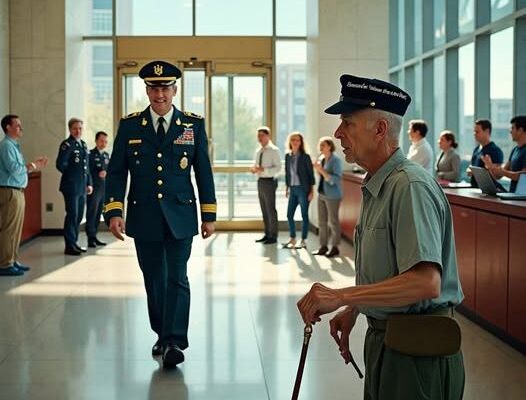Robert “Bobby” Keene wasn’t a man who craved recognition. On a quiet Tuesday morning, he entered Summit Ridge National Bank with a simple purpose: withdraw a few hundred dollars from an account he hadn’t touched in decades. That account once held hazard pay from deployments so secret, no official record could ever capture them all.
Bobby wore a black cap embroidered with gold thread: Korea / Vietnam Veteran. His shirt was pressed, though its cuffs showed wear. In his coat pocket rested his VA card, folded discharge papers, and a smooth brass challenge coin—carried for years, polished by touch.
He waited his turn, patient and respectful, like men of his generation. At the counter, he handed over his ID. “Robert Keene. Just need a withdrawal,” he said calmly.
The teller, barely out of college, frowned. After typing a few keys, she waved over the manager. His name was Caden—slick hair, smug expression, authority unearned but wielded with arrogance.
“This account yours, sir?” Caden drawled, twisting the word into insult. He flipped through Bobby’s discharge papers and scoffed. “These look like they came off a typewriter from the Stone Age.” The teller stifled a laugh.
Without a word, Bobby set his brass challenge coin on the counter. A Thunderbird, seven stars—symbols only a soldier would truly understand.
Caden didn’t even glance at it. “Cute trinket. You can order those online. Security, escort him out. Another wannabe vet trying to scam us.”
The guard hesitated, but the damage was done. Some customers smirked; others raised their phones to record. Bobby simply pocketed the coin and walked to a bench by the window. He sat tall, hands folded over his cane, eyes fixed on the flag outside.
The lobby grew quieter—not out of respect yet, but from creeping doubt.
One woman wasn’t laughing. Maya Rodriguez, a defense contractor and former Air Force specialist, recognized that coin. Years earlier, she had seen a colonel drop the same emblem on a table—and watched every officer in the room rise to their feet. Maya stepped forward. “You just made a mistake,” she told Caden coldly.
He sneered. “If he’s that important, why isn’t anyone here with him?”
Maya didn’t answer. She stepped outside and made a call.
Meanwhile, an older bank employee—someone who had worked there for decades—overheard the name Robert Keene. His eyes shifted to a brass plaque on the wall honoring Summit Ridge Command Base, once located on that very ground. Among the engraved names: Colonel R.J. Keene.
The employee picked up the phone and quietly spoke six words: “It’s Bishop Coyne. Summit Ridge. He’s here.”
Two blocks away, Major General Everett Kane slammed down his receiver, left a briefing mid-sentence, and pulled on his dress uniform. Robert Keene wasn’t just a name to him. He was a legend—a man whose doctrines had shaped modern reconnaissance. The thought of him being mocked in public was intolerable.
Back at the bank, tension thickened. The teller avoided Bobby’s eyes. Caden muttered about “fakes.” Bobby sat unmoved, steady as a mountain.
Then the glass doors swung open. The sound of boots striking tile cut through the lobby.
Major General Kane entered, ribbons gleaming, his presence commanding silence. Every conversation stopped.
Ignoring everyone else, Kane walked straight to the old man on the bench. Then, in front of stunned customers, he snapped to attention and delivered a sharp salute.
The crack of his hand meeting his brow echoed through the room. Bobby rose slowly and returned the salute with quiet dignity.
General Kane turned on the staff, his voice like steel. “Who here called Colonel Robert Keene a fraud?”
The silence was suffocating.
Kane pressed on. “Colonel Keene served in two wars, six theaters, and fourteen classified operations. The very doctrine of joint-force reconnaissance exists because of him. And this bank—you built it on land secured under his command. And you dare question his service because his papers are old?”
Caden’s face went pale. He tried to speak, but Kane cut him short. “Of course they’re old. Because he earned his years. While you were busy scheduling posts, he was carrying this nation on his back.”
An aide produced a folder marked classified and a photograph of the plaque on the bank wall with Keene’s name etched in brass. The truth was undeniable.
Kane turned back to Bobby, his voice softening. “Sir, I owe you an apology. If I’d known, I’d have met you at the door.”
Bobby only nodded. “Didn’t come to be found. Just needed enough to help my grandson with school.”
The two men walked together to the counter. This time, no one dared laugh. Customers stood taller, some in reverence, some in shame.
After the transaction, Kane placed a small velvet box in Bobby’s hands. Inside was a medal engraved with three words: Service Beyond Record.
Bobby tucked it away quietly, as he had carried his coin for years. When he left, the entire bank rose to its feet. Veterans saluted. Civilians bowed their heads. Even the young teller whispered a tearful apology.
Robert Keene hadn’t asked for honor, but this time, silence followed him not out of dismissal, but out of reverence.
Days later, the bank added a new inscription to its plaque:
Colonel Robert J. Keene — Honor in Silence.
Now, every customer who enters sees his name—a reminder that true heroes don’t need to shout their legacy.



